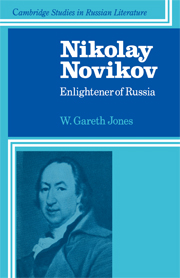Book contents
- Frontmatter
- Contents
- Acknowledgements
- Foreword
- 1 Noble beginnings (1744–69)
- 2 A family of satirical weeklies (1769–73)
- 3 The Drone (1769–70)
- 4 Imperial patronage (1770–3)
- 5 In search of the Russian reader (1773–5)
- 6 Disillusions and doubts (1774)
- 7 The historian (1773–91)
- 8 The freemason (1775–80)
- 9 A move to Moscow (1779–83)
- 10 The Russian reader discovered (1779–82)
- 11 The Typographical Company (1784–91)
- 12 Martyrdom and meditation (1791–1818)
- Afterword
- Notes
- Bibliography
- Index
- Frontmatter
- Contents
- Acknowledgements
- Foreword
- 1 Noble beginnings (1744–69)
- 2 A family of satirical weeklies (1769–73)
- 3 The Drone (1769–70)
- 4 Imperial patronage (1770–3)
- 5 In search of the Russian reader (1773–5)
- 6 Disillusions and doubts (1774)
- 7 The historian (1773–91)
- 8 The freemason (1775–80)
- 9 A move to Moscow (1779–83)
- 10 The Russian reader discovered (1779–82)
- 11 The Typographical Company (1784–91)
- 12 Martyrdom and meditation (1791–1818)
- Afterword
- Notes
- Bibliography
- Index
Summary
Despite the distant friendship which Novikov still enjoyed after his release from the Schlüsselburg Fortress, the solicitude of his past collaborators and the warm regard of his protégés, in comparison with his position at the centre of the intelligent, enlightened society of Moscow, it was as a not fully rehabilitated ‘unperson’ that Novikov lived out his days in the backwater of Avdot′ino in the early years of the new century. Despite the pardon from Paul, the fact of his public disgrace ensured that he was to remain distrusted and shunned by his suspicious, unenlightened peers. There were occasional attempts to rescue his memory: Karamzin wrote an eloquent plea on behalf of Novikov's bereaved family to Alexander I in 1818, and even if it had little practical effect, it kept the memory of Novikov flickering alive. Kireyevsky's review of Russian literature in 1829, the year which ironically saw yet another edition of Novikov's anonymous Painter, reflected that:
Were it not for Karamzin's mention of him, then perhaps many reading this article would be hearing for the first time of the work of Novikov and his companions and would doubt the credibility of events so close to us. The memory of him has almost perished; the participants of his labours have scattered and become immersed in the dark cares of private activity; many are no more; but the work completed by him has remained: it lives on, it bears fruit and awaits the gratitude of posterity.
- Type
- Chapter
- Information
- Nikolay NovikovEnlightener of Russia, pp. 224 - 229Publisher: Cambridge University PressPrint publication year: 1984

